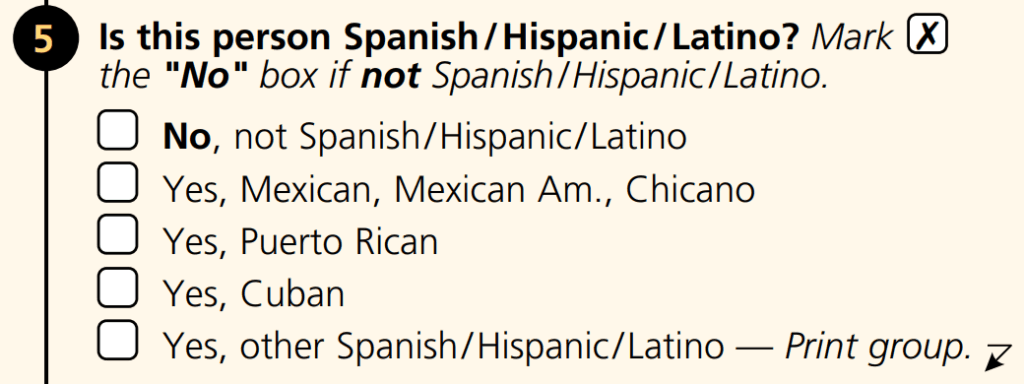If you’re like me, you don’t know what to call anyone anymore. Chances are you’ll probably annoy someone, no matter what you say. In that spirit, I got a good one for you. It’s a term that you should definitely be using—or not using. What is Latinx? Here’s the short-ish answer.
Background
Before starting, it’s worth noting that most of the terms that I’ll mention are decidedly American creations. The US Census Bureau has tried for years to quantify the number of residents who come from anywhere south of the contiguous US. By doing so, the Census Bureau has made the decision to lump disparate groups into one general category. (To be fair, we can cut them some slack, because the terms European and African are accepted worldwide, even though those umbrella words cover some serious heterogeneity.)
We can start with the term Hispanic. This word first showed up in the 1980 census, as shown below.

Hispanic is the English word for hispano, a Spanish word referring to people whose culture and traditions are rooted in Spain. Unfortunately, it comes with a few issues on this side of the world. Firstly, it references the colonizer, which serves as a point of contention for some. Secondly, not all people who are called Hispanic have roots in Spain—they may speak Spanish but actually have African or indigenous roots. Finally, not everyone even speaks Spanish—Portuguese and French are also in the mix.
Enter the term Latin America, which simply refers to the part of the Americas where languages derived from Latin (i.e. the Romance languages) predominate. We’re talking about languages like the aforementioned Spanish, French, and Portuguese. While this terminology solves some problems, it discounts the importance of indigenous languages, leaves out people from Spain (which may or may not be a concern), and overlooks several other nuances.
Regardless, someone from Latin America would be referred to as Latino. By the 2000 census, the question of interest included this addition.

And that’s where things get interesting…
What Is Latinx?
Assuming we stick with Latino as the preferred terminology, we get into other controversial territory. The Spanish language (like many) has built-in gender, with the -o ending usually indicating masculine and the -a ending usually indicating feminine. Technically, the term Latino excludes women, who are captured by the term Latina. Of course, both terms exclude those who are non-binary with regards to gender.
It is the non-binary group for whom the term Latinx originated. Over time, it has grown in use, sometimes being used as a replacement for Latino/Latina, thus encompassing many who do in fact associate with one of the traditional genders.
Variations that attempt to capture the same concept include Latin@ and Latine.
The plural of Latinx is sometimes written as Latinxs (no relation to the Australian band INXS).
Problems
You can’t please everyone, and the term Latinx definitely doesn’t. Objections include the corruption of standard Spanish grammar by foreign influences and the application of a non-binary term to those who are fine with the binary Latino and Latina. This latter group is also unopposed to the convention of using the masculine plural Latinos to refer to mixed-gender groups.
It has also been pointed out that Latinx is actually quite difficult for non-English-speaking Spanish speakers to pronounce.
Many would simply like to be referenced by their country of origin—Cuban, Mexican, Colombian, and so on—much like Americans and Canadians usually manage to escape being called North Americans.
If you’re confused, join the club. When in doubt, I suggest referring to everyone as something that is hard to debate—a ball of cells. The Spanish translation is pelota de células. Or is it pelotx de célulxs?
2 Responses
I didn’t realize INXS are Australian…..the rest of the article is pretty good too! Thanks.
Hahahaha. Yes, Sydney to be exact!